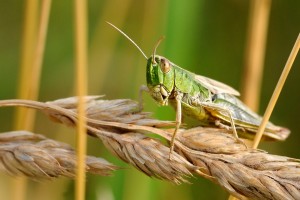A lesson on locusts
In yesterday’s post, Joel posed this question –
Has anything like this ever happened in your days
or in the days of your ancestors? Joel 1:2
And what was he talking about? Well, locusts.
What the locust swarm has left
the great locusts have eaten;
what the great locusts have left
the young locusts have eaten;
what the young locusts have left
other locusts have eaten. Joel 1:4
 The people at the time will have been well aware of the ravaging effect of a swarm of locusts. Stories about plagues of locusts will have been passed down since the time of slavery in Egypt. They may well have experienced this phenomena in their own time and their own land.
The people at the time will have been well aware of the ravaging effect of a swarm of locusts. Stories about plagues of locusts will have been passed down since the time of slavery in Egypt. They may well have experienced this phenomena in their own time and their own land.
We are probably less familiar with locusts. This clip on swarming locusts from Planet Earth makes for fascinating viewing.
A locust is basically a grasshopper. In normal circumstances, there’s not much to tell them apart. A locust is a typically solitary insect with a solitary lifestyle much like a grasshopper. But get a few together after a time of drought when the land is becoming more fertile again and their behaviour becomes more systematically destructive. A locust’s behaviour changes on crowding – on getting together with others (sounds like a Saturday night out in the town!). The few attract a few more until the swarm reaches epic proportions – up to 50 billion in a 460 square mile area. A plague of locusts becomes a devastating natural disaster. When they pass through, there is absolutely nothing you can do to stop them. They eat all the crops in their path, resulting in famine and starvation for the human population.
Joel may well be talking about a literal plague of locusts. Wave after wave of these destructive creatures, each group stripping the land bare before moving on. Some scholars believes that Joel is referring to a succession of invading armies. Either way, the effect on the people is the same. We’ll stick with the locust version of events.
Now is the time to weep and wail. There will be no new wine – all the grapes have been destroyed. No more fig trees. Even the bark has been stripped off and the trees left white and bare. No more grain. No more olive oil. It’s a time for mourning and grieving. Nothing will ever be the same again. There’s nothing left to offer as grain and drink offerings in the house of the Lord. It’s time for the farmers and vine growers to despair and grieve. There is nothing left. Literally nothing left.
The vine is dried up
and the fig-tree is withered;
the pomegranate, the palm and the apple tree –
all the trees of the field – are dried up.
Surely the people’s joy
is withered away. Joel 1:12
Most of us will struggle to relate to this sense of joy being linked to harvest. We’ve lost that connection to the earth. It’s easy for us to forget where our food comes from. If you have money to pay for it, there’s always be the food we want on the supermarket shelves. In agricultural communities around the world, their health and happiness is directly linked to what they produce. They have to rely on the sun and rain to come at the right times to grow their crops and there is absolutely nothing they can do about it. A natural disaster like a plague of locusts can arrive without warning and affect the whole community for years to come. Their food supply has been cut off before their very eyes. There is no instant answer – new crops and trees take time to grow.
Their joy is linked to the land (as is ours indirectly, I believe, but it will take us years to realise that and realise that what we are doing to the planet will affect the long term health and happiness of humankind).
There is a right time to lament. Grieving is a right and natural response. Calling out to God in our pain and anguish when a part of our lives is destroyed is OK. More than OK. We don’t have to put a brave face on it and pretend that everything is OK. We don’t have to come out with platitudes about how everything works together for good when our hearts are breaking into a million tiny pieces.
This comes first. Rallying around and starting to rebuild comes after this precious time of mourning. First we turn to God. First we cry out to Him in our anguish and despair. First we gather our people around us to mourn with us.
When everything has gone, to you, O Lord, I call.
When everything has been destroyed, to you, O Lord, I call.
When my heart is breaking within me, to you, O Lord, I call.
When I am surrounded by despair, to you, O Lord, I call.












